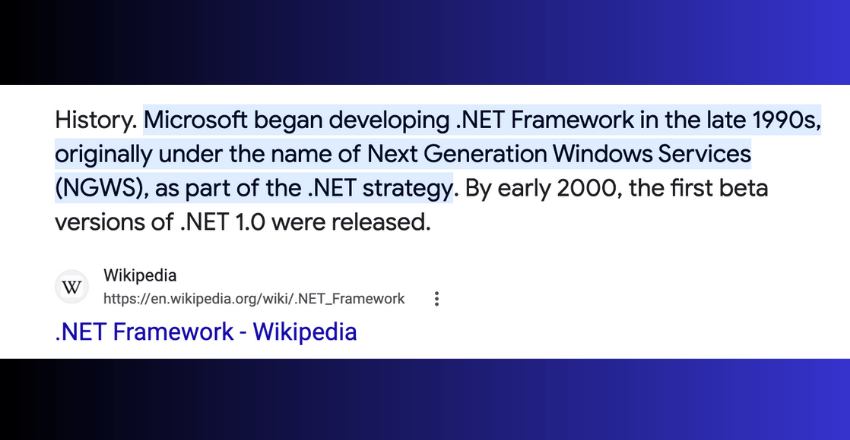
The History of .NET began in the late 1990s, envisioned by Microsoft as a response to evolving software development challenges.
In this article, we’ll explore the development and evolution of .NET, from its early beginnings to its current state. We’ll also discuss the reasons behind the shift from classic .NET to .NET Core and the benefits it brought to developers.
As a leading software outsourcing company in Brazil, South America, Hire .Net Developer has extensive expertise in .NET development. We believe in the power of this framework and know firsthand how it can transform software development projects.
Key Takeaways:
- The history of .NET encompasses its evolution from early versions to the present-day .NET Core framework.
- The .NET framework has had a profound impact on the tech world, with its popularity among developers and real-world examples of successful applications built with it.
Exploring the Development and Evolution of the .NET Framework
The .NET framework was first introduced in early 2000, with the aim of providing a comprehensive platform for developing software applications. The initial framework was developed by Microsoft and was designed to support multiple programming languages, such as C#, VB.NET, and F#. In the years since its creation, the framework has undergone significant development and evolution.
One of the key milestones in the history of .NET was the release of .NET Core, an open-source, cross-platform version of the framework. .NET Core was introduced in 2016 and brought many benefits to developers, such as improved performance, reduced memory consumption, and increased flexibility. The 5th and the latest version of the .NET framework was released in November 2020 with new improvements and features.
The evolution of the .NET framework has been driven by a number of factors, such as advances in hardware, changes in software development methodologies, and the emergence of new programming languages. One of the most significant advancements has been the introduction of the C# programming language, which has become the primary language used within the .NET ecosystem.
Key Milestones in .NET History
Over the years, there have been many significant milestones in the history of .NET. Some of the most notable include:
- The release of the initial version of the .NET framework in 2002
- The introduction of Visual Studio, an integrated development environment (IDE) for .NET, in 2003
- The release of .NET Core in 2016
- The launch of .NET 5 in November 2020
These milestones have marked significant advancements in the development and evolution of the .NET framework, bringing new capabilities and features to developers.
Let’s take a closer look at some of the key features that have been developed in .NET over time.
The Journey from Classic .NET to .NET Core
Charting the course of the .NET ecosystem, the shift from the classic .NET framework to .NET Core stands out as a monumental transformation. This evolution has been both extensive and exhilarating. Launched in 2016, .NET Core has since experienced a slew of refinements and enhancements.
Motivating this transition was the aspiration for a more streamlined, modular, and cross-compatible framework. While the classic .NET framework adeptly catered to Windows-centric applications, it grappled with constraints for other OS like Linux and macOS. In contrast, .NET Core bridges these gaps, offering a harmonized development ambiance across diverse platforms.
Embracing .NET Core has unlocked myriad advantages for developers. This rejuvenated framework is nimble, swift, and deployment-friendly. It boasts amplified performance, fortified security measures, and superior container support. Moreover, .NET Core endows developers with heightened flexibility and mastery over the development trajectory.
Thanks to its innovations, .NET Core is apt for crafting a spectrum of applications, spanning web, desktop, cloud-centric, to microservices. Developers can further amplify their .NET Core experience by integrating frameworks like ASP.NET Core and EF Core.
Early Beginnings of .NET
Tracing back, the origins of .NET began in the early 2000s. Microsoft harbored ambitions of crafting a platform tailored for constructing scalable and resilient applications.
They dreamt of a holistic framework, facilitating developers to seamlessly create applications spanning desktop, web, and mobile. Indeed, 2002’s .NET debut stands as a pivotal moment in software development chronicles.
Central to its design, the .NET framework championed the ethos of multi-language support. This meant developers could handpick their favored language for application development.
In this spirit, Microsoft introduced languages like C# and VB.NET, meticulously tailored for .NET. Additionally, the framework embraced established languages such as C++ and COBOL. This inclusivity ensured developers could transition to .NET with minimal friction.
Key Moments in the History of .NET
Tracing back, the history of .NET is punctuated by pivotal events and landmarks that have steered its journey. Let’s navigate through these defining moments:
Starting in 2002: .NET Framework 1.0 made its debut. This inaugural version heralded a transformative phase in software crafting, equipping developers with a potent platform for creating resilient, scalable applications, irrespective of their chosen language.
Fast forward to 2005: The unveiling of Visual Studio 2005 and .NET Framework 2.0 enriched the ecosystem. This iteration brought forth enhancements spanning security, performance, and dependability.
Come 2007: .NET Framework 3.0 was launched. This version ushered in novel technologies like Windows Communication Foundation (WCF), Windows Workflow Foundation (WF), Windows Presentation Foundation (WPF), and Windows CardSpace, broadening horizons for developers.
By 2010: .NET Framework 4.0 was introduced. This substantial upgrade amplified performance, scalability, and deployment facets. It also debuted features such as Parallel Programming, Code Contracts, and the Dynamic Language Runtime (DLR).
Transitioning to 2015: .NET Core 1.0 saw the light of day. This release signified a paradigm shift, offering a cross-platform, open-source framework, heralding a refreshed .NET chapter.
In 2016: .NET Core 1.1 was rolled out alongside the debut of .NET Standard 2.0. This update enriched the framework with performance boosts and runtime adaptability. Concurrently, .NET Standard 2.0 presented a cohesive API for all .NET platforms.
Lastly, in 2019: .NET Core 3.0 and .NET 5.0 were introduced. These versions were watershed moments, incorporating features like support for Windows Desktop Applications, client-side Blazor, and C# 8.0.
These milestones merely scratch the surface of .NET’s illustrious history. Each iteration has indelibly contributed to the framework’s maturation, sculpting today’s software development canvas.
The Impact of .NET on the Tech World
Since its introduction, the .NET framework has profoundly shaped the tech landscape. Its mark is unmistakably seen in the global embrace of the framework by developers. Let’s delve into the ways .NET has transformed the tech sector:
Firstly, Enhanced Software Development: .NET has streamlined and optimized the software creation process. It equips developers with an all-encompassing array of libraries, tools, and languages, facilitating swift application development. This efficiency has expedited software timelines, curtailed expenses, and boosted productivity.
Secondly, Universal Embrace: .NET stands as one of the predominant frameworks for software crafting. Industries spanning finance to education have adopted it, underscoring the framework’s reliability and adaptability.
Thirdly, Crafting Robust Applications: Renowned for fostering some globally recognized applications, .NET is apt for sculpting secure, scalable, and high-performing solutions. Notable creations like Microsoft Office, Skype, and Visual Studio owe their existence to it.
Furthermore, Standardizing Development: .NET offers a uniform development milieu, harmonizing collaborative developer efforts. With a shared toolkit and language set, it eases the induction process for newcomers to projects.
Lastly, Ongoing Advancements: .NET is in a state of perpetual evolution, aligning with the tech sector’s dynamic demands. Fresh features and frameworks continually emerge, ensuring .NET developers remain at the forefront of software trends.
The magnitude of .NET’s influence on the tech domain is immense. It’s been pivotal in modernizing software development and spurring industry growth. At Hire .Net Developer, our mission is to harness .NET’s prowess to craft top-tier solutions tailored to client specifications. Reach out to delve deeper into our .NET proficiency.
The Rise of C# Programming Language

Over time, C# has emerged as the primary programming language for the .NET framework, with an increasing number of developers embracing it. This surge in popularity stems from various factors, notably its user-friendliness, intuitive syntax, and harmonious integration with the .NET ecosystem.
Originally, C# was conceived by Microsoft in 2000, anchoring their .NET vision. Their goal was to craft a contemporary, object-oriented language that would streamline coding and elevate developer efficiency. Over the years, it has seen numerous refinements. The recent version, C# 9.0, brought forth innovations like pattern matching and record types.
A significant edge of C# is its capacity to tap into the .NET framework’s vast capabilities, presenting a plethora of features that ease development and minimize code intricacy. Furthermore, C# boasts remarkable versatility, suitable for crafting diverse applications spanning desktop, web, mobile, and gaming.
Given its widespread acclaim, C# proficiency has become a coveted asset in the tech realm. Numerous enterprises are on the hunt for adept C# developers. Consequently, mastering C# can be a strategic move for developers aiming to propel their careers and engage in stimulating ventures.
Advancements in the .NET Development Environment
The .NET development environment has evolved significantly over the years, offering developers a seamless and efficient experience. One of the key tools in this environment is the Visual Studio IDE, which has undergone several updates and enhancements to better support .NET development.
Visual Studio IDE provides a comprehensive set of tools and features that make coding in .NET easier and more efficient. It offers intelligent code completion, debugging, and testing capabilities, as well as integration with other tools such as Git and Azure.
| Advancements in .NET Development Environment | Description |
|---|---|
| Visual Studio IDE | Provides a comprehensive set of tools and features that make coding in .NET easier and more efficient. |
| Integration with Other Tools | Offers integration with other tools such as Git and Azure for seamless workflow. |
| .NET Core | The introduction of .NET Core has simplified and streamlined the development process, making it easier to build cross-platform applications. |
.NET Core has revolutionized development, facilitating easier cross-platform application creation. This lets developers craft superior apps swiftly and efficiently.
The .NET environment now integrates frameworks like ASP.NET and Entity Framework. Open-source tools like Roslyn and .NET Compiler Platform further enrich the .NET ecosystem.
In essence, .NET’s advancements simplify robust application development. With continuous updates, .NET’s future is incredibly promising.

The Future of .NET
.NET framework has evolved significantly, and its trajectory is optimistic. As the need for top-tier, scalable apps grows, .NET adapts for developers and businesses.
A rising .NET trend is AI and machine learning integration. With .NET 5.0, developers utilize ML.NET for custom machine learning models, simplifying data analysis.
Cross-platform development is another focus. Thanks to .NET Core, apps run on Windows, Linux, and macOS. .NET 6.0 promises further enhancements.
.NET’s future promises better security and swifter performance. Advancements in hardware and cloud let developers optimize application efficiency.
For developers, staying current with .NET trends is vital. Harnessing .NET’s capabilities ensures they craft cutting-edge, resilient applications.
Leveraging .NET for Software Development Projects

.NET framework is a top pick for software projects due to its power and adaptability, benefiting both developers and businesses.
A prime advantage of .NET is its scalability, accommodating everything from small apps to vast enterprise solutions. Its flexibility lets developers use languages like C#, VB.NET, and F#, tailoring to project needs.
Known for reliability, .NET ensures secure, consistent applications. It integrates seamlessly with Microsoft technologies, streamlining development. Using .NET typically means quicker development, superior apps, and cost savings. It’s a dynamic framework for crafting impactful solutions.
Embracing the Power of .NET with Hire .Net Developer
Searching for a top-tier .NET development outsourcing company? Choose Hire .Net Developer! Our experienced team delivers world-class solutions tailored to your needs.
At Hire .Net Developer, we prioritize staying updated with .NET advancements, guaranteeing clients modern solutions. Our experts excel in .NET Core, ASP.NET, and Xamarin.
Partner with us for unparalleled quality. We collaborate closely, ensuring timely, high-standard project completion. Reach out now to harness .NET’s potential for your project.
Conclusion on the History of .NET
The history of .NET is rich, shaping the tech landscape. From its inception to now, it’s evolved into a top software development technology.
.NET Core marked a pivotal evolution, offering developers better performance and wider platform compatibility. Its popularity underscores its success, with the rise of C# and .NET tools fueling its growth.
Looking ahead, .NET promises exciting innovations. Developers should stay informed to harness its full potential. The expertise of Hire .Net Developer company showcases .NET’s capability in delivering superior software solutions.
FAQs

When did the journey of .NET begin?
Origins: Microsoft introduced .NET in the late 1990s, aiming to address the evolving challenges of software development.
How has .NET evolved over the years?
Evolution: Initially Windows-centric, .NET has transformed into a cross-platform framework, adapting to the industry’s changing landscape.
What was the primary goal behind .NET’s inception?
Vision: Microsoft envisioned .NET to simplify application development, promoting interoperability and reducing the complexity of deploying software.
Which version of .NET marked a significant shift in its capabilities?
.NET Core: Introduced in 2016, this version emphasized modularity and cross-platform development, expanding .NET’s reach and flexibility.
How has the community influenced .NET’s trajectory?
Community Impact: Over the years, feedback and contributions from the developer community have shaped .NET, ensuring its relevance and continuous improvement.

Jessica is a highly accomplished technical author specializing in scientific computer science. With an illustrious career as a developer and program manager at Accenture and Boston Consulting Group, she has made significant contributions to the successful execution of complex projects.
Jessica’s academic journey led her to CalTech University, where she pursued a degree in Computer Science. At CalTech, she acquired a solid foundation in computer systems, algorithms, and software engineering principles. This rigorous education has equipped her with the analytical prowess to tackle complex challenges and the creative mindset to drive innovation.
As a technical author, Jessica remains committed to staying at the forefront of technological advancements and contributing to the scientific computer science community. Her expertise in .NET C# development, coupled with her experience as a developer and program manager, positions her as a trusted resource for those seeking guidance and best practices. With each publication, Jessica strives to empower readers, spark innovation, and drive the progress of scientific computer science.






